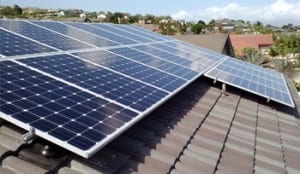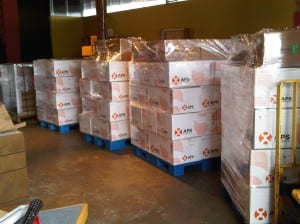Solar Farms deploys APS YC500 in Hawaii installation




APS America has added Hawaii to its list of regional deployment for the YC500A-H microinverters. First shipments started going to Hawaii in December 2012 and have been ramping up since then. APS America sent out its first container load of YC500A-H microinverters to Hawaii today. New customers are largely developers who recognize the value of the dual panel configuration of the YC500A-H and the labor savings of the installation. The microinverters shipped to Hawaii are programmed to meet the HECO Rule 14 requirements for output frequency.


The APS Microinverter YC200-NA received the American UL certificate on December 8th, 2011. Having already received the CQC, TUV and SAA certificates, this latest international recognition marks an important milestone approving the APS Microinverter for the North American solar power market.
Recently, APS established the “100 Schools Solar Roof Program” in Jiaxing, installing PV systems with APS Microinverters on Jiaxing’s Shiyan primary school and Jiaxing’s San Shui Wan primary school. Because APS microinverters were used, the PV system was quickly and easily installed, and the installation did not disrupt classes. The system emits no high-voltage DC electricity, guaranteeing the students’ safety. The Energy Monitor and Analysis (EMA) System developed by APS combines two functions: PV system monitoring and student education. Students experience how modern science and technology can change their lives, including how to lower their carbon emissions and protect the environment. It is our hope that this project be carried out at many other schools in Jiaxing.
The APS Australia office was recently opened. Responsible for the sales and marketing of APS products to the Australia market, the office will also provide technical support to local customers. APS has installed three microinverter PV systems in Australia, which has created local interest in APS’ product. APS intends to ship the first 1,000 microinverters to Australia by the end of 2011. In 2012, the company is expected to achieve its goal of installing 30,000 microinverters in Australia.
APsystems is the #1 global multi-platform MLPE solution provider, offering microinverter, energy storage and rapid shutdown devices for the solar PV industry. APsystems brands include APsmart and APstorage. Founded in Silicon Valley in 2010, APsystems encompasses 4 global business units serving customers in over 100 countries. With millions of units sold producing more than 4TWh of clean, renewable energy, APsystems continues to be a leader in the ever-growing solar MLPE segment.
At APsystems, we are committed to providing the highest quality service to our customers and partners around the world.
8627 N. Mopac Expy, Ste 150
Austin, TX 78759
United States of America
Phone:1-844-279-8600
